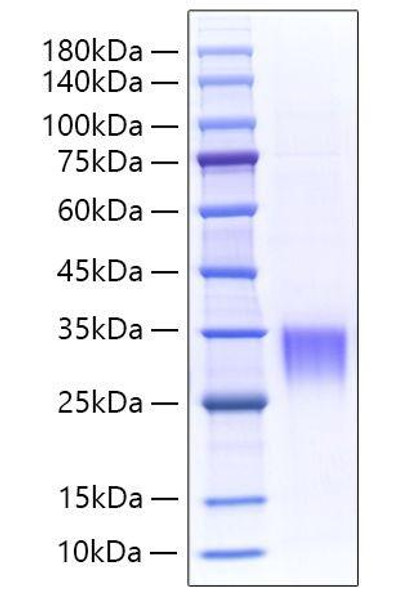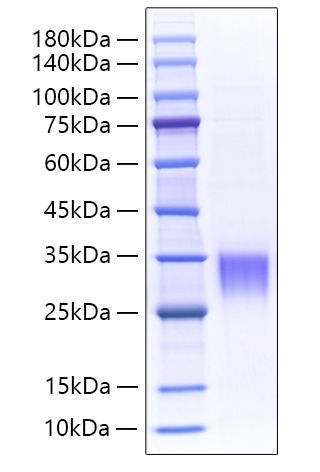Description
Recombinant Mouse Asprosin/Fibrillin-1/FBN1 Protein
The Recombinant Mouse Asprosin/Fibrillin-1/FBN1 Protein is a high-quality recombinant protein designed for murine biological research applications. This protein serves as an essential reagent in mouse model studies, comparative immunology research, and preclinical therapeutic evaluations, enabling scientists to investigate Asprosin/Fibrillin-1/FBN1 biology and its relevance to human disease mechanisms through translational research approaches.
This product (SKU: RPCB1729) is produced using HEK293 cells and features a N-His tag for convenient detection and purification. The protein exhibits a calculated molecular weight of 16.73 kDa with an observed molecular weight of 25-35 kDa under denaturing conditions, achieving ≥ 90% as determined by SDS-PAGE., ensuring exceptional quality and consistency for research applications.
Key Features
| High Purity by Affinity Chromatography | |
| Mammalian & Bacterial Expression Systems | |
| High lot-to-lot consistency via strict QC |
| Product Name: | Recombinant Mouse Asprosin/Fibrillin-1/FBN1 Protein |
| SKU: | RPCB1729 |
| Size: | 10 μg , 20 μg , 50 μg |
| Reactivity: | Mouse |
| Synonyms: | Fibrillin-1, Fbn1, Asprosin, Fbn-1, FBN1 |
| Tag: | N-His |
| Expression Host: | HEK293 cells |
| Calculated MW: | 16.73 kDa |
| Observed MW: | 25-35 kDa |
| Gene ID: | 14118 |
| Protein Description: | High quality, high purity and low endotoxin recombinant Recombinant Mouse Asprosin/Fibrillin-1/FBN1 Protein (RPCB1729), tested reactivity in HEK293 cells and has been validated in SDS-PAGE.100% guaranteed. |
| Endotoxin: | < 1 EU/μg of the protein by LAL method. |
| Purity: | ≥ 90% as determined by SDS-PAGE. |
| Formulation: | Lyophilized from a 0.22 μm filtered solution of PBS, pH 7.4. |
| Reconstitution: | Centrifuge the tube before opening. Reconstitute to a concentration of 0.1-0.5 mg/mL in sterile distilled water. Avoid vortex or vigorously pipetting the protein. For long term storage, it is recommended to add a carrier protein or stablizer (e.g. 0.1% BSA, 5% HSA, 10% FBS or 5% Trehalose), and aliquot the reconstituted protein solution to minimize free-thaw cycles. |
| Storage: | Store at -20℃.Store the lyophilized protein at -20℃ to -80 ℃ up to 1 year from the date of receipt. After reconstitution, the protein solution is stable at -20℃ for 3 months, at 2-8℃ for up to 1 week. |
Asprosin is a protein hormone that is produced by white adipose tissue in mammals (and potentially by other tissues), which is then transported to the liver and stimulates it to release glucose into the blood stream. In the liver asprosin activates rapid glucose release by a cAMP-dependent pathway. The glucose release by the liver into the blood stream is vital for brain function and survival during fasting. People with neonatal progeroid syndrome lack asprosin, while people with insulin resistance have it in abundance. In animal tests asprosin showed potential for treating type 2 diabetes. When antibodies targeting asprosin were injected into diabetic mice, blood glucose and insulin levels improved.







